late summer
Showing 97–108 of 134 results
-
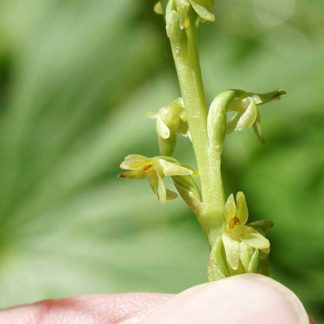
Plantanthera unalascensis / slender-spire orchid
- teeny, green flowers, well-separated, not spiraled
- a "tall, thin, green nothing"
- basal leaves prostrate, but not appressed to the ground
- leaves often wither before pollination occurs
- found in many different habitats
-

Potamogeton richardsonii / Richardson’s pondweed
- submerged aquatic with emergent inflorescence
- crinkly, broad-ish leaves which clasp the stem
- variable length internodes
- often tangled up with sago pondweed
-

Potentilla fruticosa / shrubby cinquefoil
- low, deciduous, shrub; wetlands and riparian zones
- yellow buttercup-like flowers with 5 leaflets, often in clusters
- blooms from June until frost
- pinnately compound leaves, typically with 5 leaflets
- fruit (achene) remains into winter
-
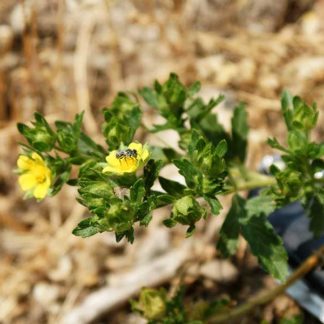
Potentilla norvegica / rough cinquefoil
- 5 yellow petals, not fused
- 5 sepals longer than petals, esp. after flowering
- numerous stamens and pistils
- compound leaves with leaflets grouped in 3s
- prominent veins; toothed margins
- hairy stems
- mostly in disturbed areas, including gardens
-
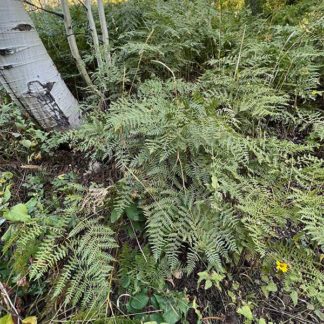
Pteridium aquilinum / common bracken
- a fern with large, triangular fronds, up to 4 ft tall
- fronds subdivided into triangular leaflets
- herbaceous perennial
- deciduous with annual regrowth first appearing as fiddleheads in spring
- wide range of habitats, including full sun
-
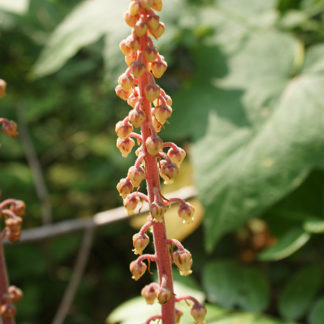
Pterospora andromedea / woodland pinedrops
- sticky-haired, reddish brown plant; no chlorophyll
- nodding, yellow and pink flowers like upside-down urns
- unbranched stem with "invisible" scale-like leaves at base
- old, woody stalks with pumpkin-shaped capsules persist at least one season
- in pine or mixed conifer forests
-

Ranunculus aquatilis / common water crowfoot
- found in slowly flowing water ways, ditches, ponds
- white, waxy flowers with yellow centers; 4 or 5 petals
- flowers raised a couple inches above the water surface
- usually grows in dense mats that look a lot like slime
-
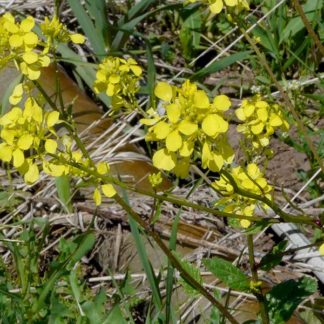
Rhamphospermum arvense / Charlock
- yellow-flowered brassica; flowers larger than most mustards
- large-ish leaves with toothed margins
- erect stems; look for a reddish purple ring at stem junctions
- disturbed areas, road sides and waste places; prefers high nutrients
- 1" siliques point out or up, but not down
-

Rudbeckia occidentals / western coneflower
- dark cone-shaped flower head - like a sunflower without petals
- ring of yellow "bumps" visible during pollination time
- "cones" about 1" but double that when in seed.
- usually a tall plant with sunflower-like leaves
- alternate (not opposite) leaves
-
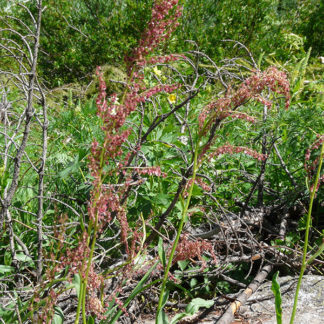
Rumex acetosella / sheep sorrel
- long, vertical inflorescences... not compact or well "organized"
- female plants with red/maroon flowers; males with green/white flowers
- especially visible when seeds are ripe... red
- basal rosette of arrowhead shaped leaves
- disturbed areas, wastelands, poor sites
-

Rumex crispus / curly dock
- rather large, lance-shaped leaves
- curly leaf margins, like crisped bacon or "crinkly-wavy"
- tall flowering stalks with many, many small yellow/green-ish flowers
- fruits are just like the flowers but deep red
- widespread and very much a weed
-
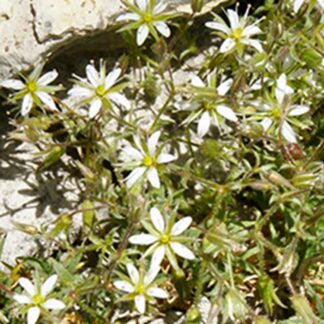
Sabulina nuttallii / Nuttall’s sandwort
- small, glandular-pubescent perennial
- trailing stems form mats
- thin, rigid, needle-like leaves, about ½" long
- small, white, 5-petaled flowers in terminal clusters
- 5 green, pointy sepals
- sagebrush hills to alpine slopes, and especially on gravelly benches or talus
Showing 97–108 of 134 results